Time Equities’ Francis Greenburger is Betting on FiDi, Anguilla and Hillary Clinton
By Liam La Guerre August 4, 2016 9:45 am
reprints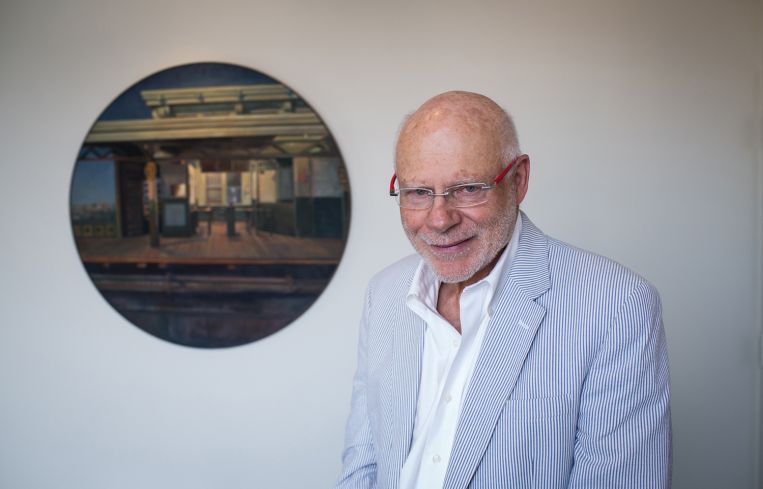
Time Equities’ founder and chief executive officer, Francis Greenburger, has a lot to think about on a day-to-day basis as his company owns more than 23 million square feet of real estate around the world.
However, the first thing he mentions to Commercial Observer after walking into his office last week, on the 15th floor of 55 Fifth Avenue between East 12th and East 13th Streets, is the Democratic National Convention and how brilliant (his word) it was of Hillary Clinton to make the junior senator from Virginia, Tim Kaine, her running mate.
Greenburger, 67, is a very outspoken political player, having donated approximately $54,000 to Clinton’s various campaigns since she first ran for a seat in the United States Senate in 2000, federal records indicate. So this son of Forest Hills, Queens, will not be voting for a fellow real estate developer and son of Queens (Donald Trump) come November.
Politics is just one aspect of Greenburger’s life, which includes his wife (Isabelle Autones) and four children (Morgan, 23, Noah, 20, Julia, 19, and Claire, 15), tennis, his nonprofit Sports & Arts in Schools Foundation, running the literary agency that his father started more than 80 years ago—Sanford J. Greenburger Associates—and, of course, real estate.
And right now Time Equities is bullish on the Netherlands, having purchased 13 commercial buildings there last year, with an average size of 40,000 square feet for a total of more than $48 million. Greenburger told Commercial Observer that the company will be closing on six more soon. Plus, in the Caribbean, Time Equities is developing a marina on a 50-acre parcel of land in Anguilla.
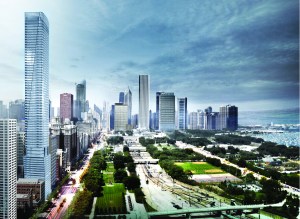
In New York City his company is completing the 64-story tall condominium 50 West Street—featuring 191 high-end units and a future luxury restaurant at its base. And Time Equities is about to begin constructing the 832-foot residential condominium and rental tower at 1000 South Michigan Avenue in Chicago, for which he recently ordered a redesign by architect Helmut Jahn.
Commercial Observer: What are your thoughts about the 2016 election?
Greenburger: I guess I should confess that I think Barack Obama is the best president in my lifetime. And so I start with that as an orientation. And the characteristics that I find so compelling about Obama are his thoughtfulness and the careful restraint that he brings to his actions. And to me, that’s how something as important as the presidency of the United States should be managed. To me, Hillary [Clinton] is a very worthwhile successor to that. She is highly experienced, highly informed, careful and the opposition has very different characteristics. So I think Hillary is the right leader for right now. I think her [vice presidential] choice of [Tim] Kaine was a brilliant pick.
Why?
I think like many Americans, perhaps, I was being traumatized by the Trump effect. You watch all that hate and bigotry and negativism—America is falling apart, crime is wild, the facts don’t matter—and you get disoriented. And then suddenly, here’s Kaine, an extremely sensible, sensitive, intelligent, very experienced leader, and it’s like a breath of fresh air.
Is the economy in a better place since Obama took office?
[We have been] completely transformed. Eight years ago coming out of [George W.] Bush, unemployment was 8.5 percent. Unemployment today is sub-5 percent. Interest rates, which help business, are at the lowest point ever. I read yesterday a report about our industrial sector. This is a record year for industrial absorption for the real estate business. That’s good for the real estate business, but what’s more is it’s great for America because there’s so much industrial space being activated because we are relativizing our industries. And we have found a way to compete with international suppliers. So the economy is doing extremely well, and that’s across the country. But to pretend that the world is collapsing [as Trump is suggesting] is silly.
Have you ever considered a political run?
I have always had a very strong interest in politics, but I never saw myself as a potential candidate. And friends sometimes kid me about it—“Oh, you should run for this” and “You should run for that.” I never thought about it in any serious way.
Who are your mentors?
In the real estate business it is [Charles] Benenson, who was one of the great realtors of our generation. In the publishing business, it’s Heinrich Maria Ledig-Rowohlt. He was the most important publisher of the 20th century.
What younger developers have you inspired?
Here at Time Equities we have a half dozen people in their 30s, many of whom have been here for at least a decade and are in and of themselves extraordinary young real estate people. Fifty West Street, that project was not run by me—it was run by somebody here named Rob Singer. Rob was an intern, and then he was an assistant to the guy who developed the concept for the building, who then left in 2006. And Rob basically picked up the pieces in 2008 in the middle of the financial crisis.
What did he do for the project?
What he had to do was reconceptualize it, sell it, raise the money for it and then see it built, all of which was monumental because of the times. So we had started building the foundation in 2008 and like a lot of people, I had to pull the plug, and then I had a mud puddle, a very expensive mud puddle. I didn’t know what we were going to do with it. It cost us $5 million a year for taxes and interest just to hold on to it. And that went on for years. And Rob, rather than being passive and just sitting there, he made sure that the 322 [city] permits that we had for the building were kept current.
Was it complicated to get the financing for the tower?
In those days there weren’t too many banks around who wanted to finance condominiums. It was a very short list—maybe five. And the maximum amount that any bank could put into a condo was $75 million. And we needed $300 million. So we needed at least [four] banks to partner on it.
How much did it take to build it?
$500 million. Actually $550 million. Originally we thought it would have been $500 million, which meant that we needed $200 million in equity. I was putting in about $80 million, and we needed somebody else to put in $120 million. So then Rob went out to the world to try to find those people. Ultimately we found a good investment banker, who said he thought he could get it for us, and he went out in the market and spent six months negotiating with CIM Group, who we found very difficult to [work with]. And all of a sudden, another hedge fund, Elliott Management, who we had never heard of even though they were among one of the largest hedge funds on Wall Street, they were hot to trot. They had been working on another deal in which they lost. And they had allocated money and wanted to place it. We made the deal with them in like a week.
So how much did they contribute?
$120 million. But ultimately, the budget went up $50 million, and we had to put in $50 million more. So we put in $130 million.
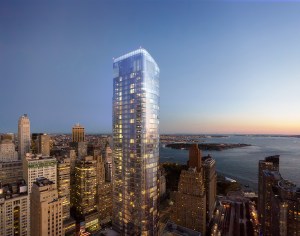
What is your target sellout at 50 West?
Right now we are expecting to break $1 billion. We are 60-odd percent sold. So we are well on our way. It will start to be completed this year. The first phase will be delivered this year—the first 30 stories.
Do you think the condo market is softening?
It’s very oversupplied right now [but] not so much in the immediately available product. If you want to actually go out and buy an apartment that you could move into, there is not that much inventory. If you want to buy an apartment for delivery a year or two from now, there are a lot of buildings that are on the planning boards. Some of those buildings will be built, but a lot of them won’t because the banks stopped putting money out about a year ago. One banker said to me this is the 10th inning of a nine-inning game.
You have been very bullish on Detroit despite the city’s bankruptcy and the steep population decline. Why?
When I went there [in 2013], I thought all these people would be depressed as the city just declared bankruptcy and it was the opposite. They said, “Look, we are so happy that we have declared bankruptcy because now we could go on with the rebuilding.” There was a revival going on in downtown Detroit, and the bankruptcy issues were holding them back.
What are you working on there?
We are just close to acquiring a major downtown building, which will be converted to apartments. The deal is not signed yet. It’s a major, iconic, historic commercial building, which is vacant and we will renovate it into rentals.
A huge project you are doing is 1000 South Michigan in Chicago. Why did you change the design plans of it?
New Year’s Day I called up the architect [Helmut Jahn]—we had it all designed and conceptually approved by the city—and I said, “Rip up the plans. I have been studying the building and getting different opinions, and it doesn’t work.” He almost shot me. But after he thought about it, he realized I was right, so we redesigned it.
What was wrong with it?
It was the way the building was structured. The building basically got bigger on top. I was in Nicaragua for Christmas holiday with my daughter and a friend of hers. And I showed it to the friend—an 18-year-old—and said, “What do you think about this?” She looks at it and said, “It looks like the building is going to fall over.” And I realized that even though the design was conceptually interesting, I said nobody is going to buy their home in a building that looks like it’s going to fall over. Home is about being secure.
Do you still own the Muskoka Bay Resort golf course in Canada?
I still own that golf course, [but] I don’t want to. We bought the land about 15 years ago. It’s in northern Toronto. It’s the Hamptons of Toronto. It’s a lake region. It’s where a lot of fashionable people from Toronto go for their holidays and weekends.
I have a partner in Toronto, Peter Freed of Freed Developments, who has traditionally built, and we have developed with him a number of residential condos. And he is very, very successful at that. And this [golf course] was an idea that he had, because he loved the area and saw all the younger demographic that he was used to working with moving [there]. It seemed like a good idea at the time, and it wasn’t.
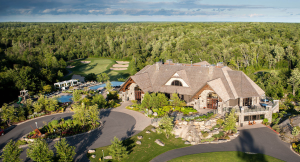
Were there problems in building it?
It didn’t even take that long to build it actually—I don’t think it took more than 18 months.
Even though it was a very attractive [area] and a lot of people were moving there, there weren’t enough people. There’s not enough absorption to really support a project of this scale. You could sell 10 houses a year, but you couldn’t sell 50.
How much would you say that you have lost from it?
It has been a long time. I wouldn’t be surprised if we lost $50 million from it. Not all at once, but maybe it’s a couple million dollars a year.
So then why not sell it?
Well, it’s complicated. Because my partner is very attached to it and it’s part of his brand image. So Peter hopes spring is eternal.
Do you believe in Canada’s real estate market?
Oh, I believe enormously in Canada. Canada has been immensely successful for us. The golf course is the only thing that we have done in Canada that has been a problem. Peter and I built a large building in Toronto that is one of the most successful deals ever in Toronto. We own a lot throughout Canada. But it’s very hard to buy anything because the prices are very, very high so we are not actively buying new things. However, we own several million square feet of properties in Canada that we bought many years ago.
You are buying in the Netherlands right now. Why?
Holland is Francis’ kind of market. It’s going through a cycle—it’s a tough cycle right now, although I think it’s just beginning to turn a corner. And we are able to buy things at low prices with good returns—our typical formula. We are going to buy as much as we can in Holland as long as the price point is good.
What about developing in Holland?
Development would be an adventure for us. It’s possible, but right now, when you are at the bottom of these cycles, you are not thinking about new and adding to the problem. You are thinking of solving the problem of the existing buildings—re-tenanting them and bringing people in and waiting for the economy to come back.
Where else in Europe are you excited about?
We have a portfolio in Germany, and we continue to like Berlin. We are buying one property right now there. Before we were buying primarily residential. The one that we are buying now is an office building.
Why the switch?
Because I just sold four buildings that we bought in Berlin about eight to 10 years ago, we sold them for sub-3 cap rates. I am not a sub-3 cap rate buyer. I am old fashioned. I like to earn 6, 8 or 10 percent of my money. Commercial still offers some opportunities in our view.
Anywhere else in the world you are investing?
We own three and a half or four very high-end villas in Anguilla. There are 13 people who maintain everything and cooks, too. And you rent these things to people to live like a king for a week or for however long you are there. And they are incredible—not to quote Donald Trump. Then there is also another 50-acre parcel, which in Anguilla is enormous, because it’s a small country, which had been zoned for a marina project and that’s the number one priority for the government of Anguilla—the prime minister got elected on the basis that he’ll help us get this thing built.
How challenging is it to build a marina?
We have teamed up with maybe the most experienced marina developers in the Caribbean—[Cross Island Development and Marine Management & Consulting] and they are putting the pieces together. Our partners, who operate a marina in St. Martin, have to find presale slips, and then we’ll be able to finance and build it.
When do you think it’ll be built?
I don’t know.
How much will it cost?
About $35 million.
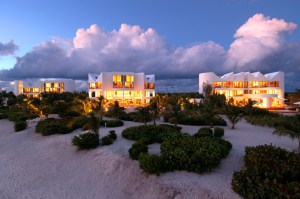
How did you acquire that property?
It was a bank foreclosure [for $8.5 million in 2014]. A Russian investor defaulted through a Canadian bank, and the bank ended up with it. It was very difficult territory because the government controls the sale of property there. And they had rejected two previous buyers because they are very particular about who they want to own property in Anguilla.
Did you have a connection in the government? How did you convince them to sell to you?
No connection. It’s just because we are a highly reputable company and we were able to get the right kind of references. And I was brutally honest with them. They were pushing me to promise all kinds of things, promises I can’t keep, so I didn’t promise anything. And I told them what my plan was.
If I wanted to stay at the villa for a week at Christmastime, how much would it cost?
The normal rates are between $15,000 and $40,000 a week, and that’s for a five- to eight-bedroom house. But if you want to rent it for Christmas, which is the most expensive day of the year, it’s around $70,000.



